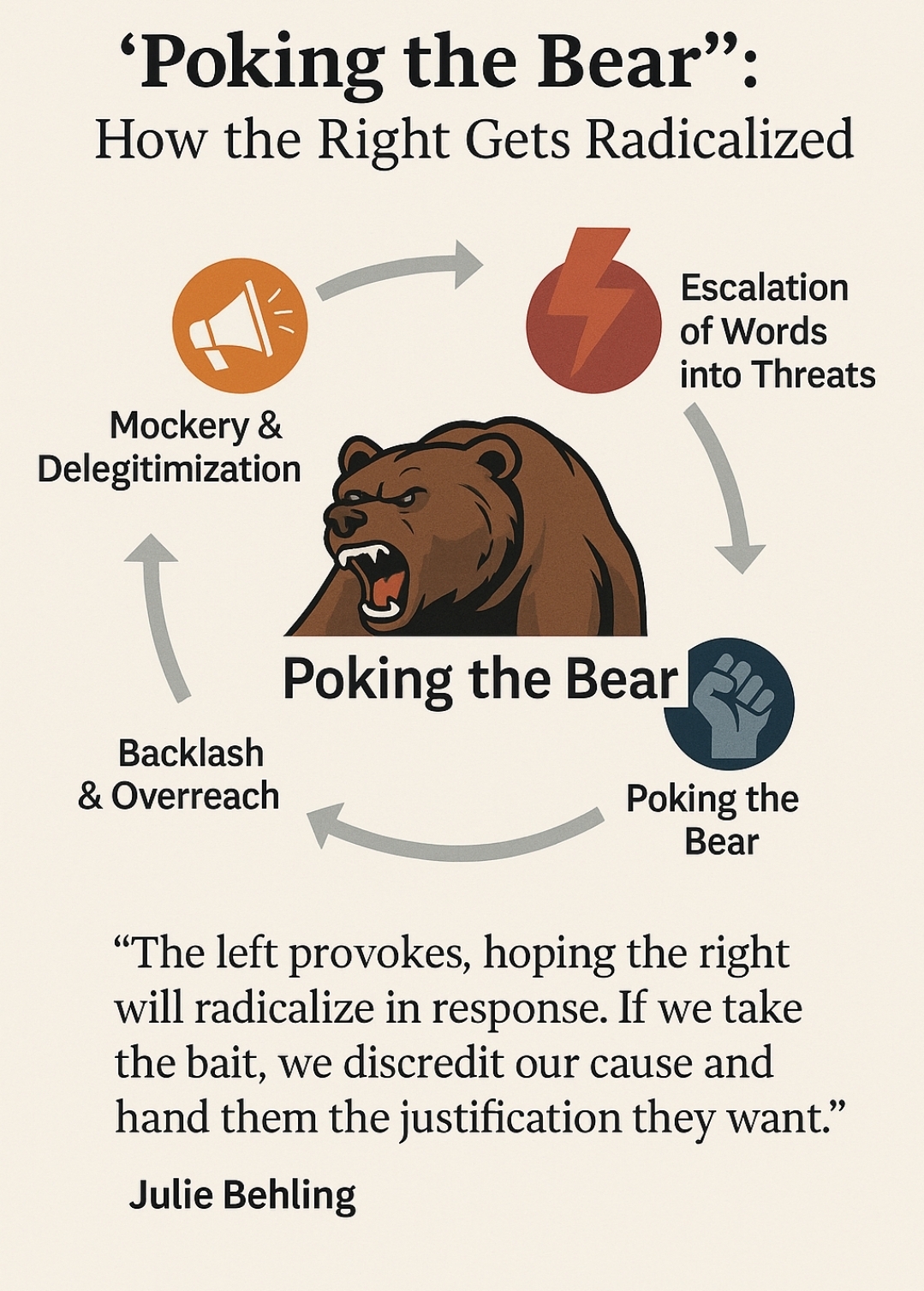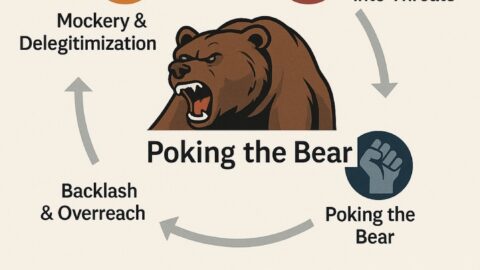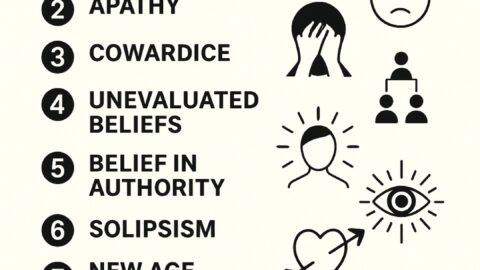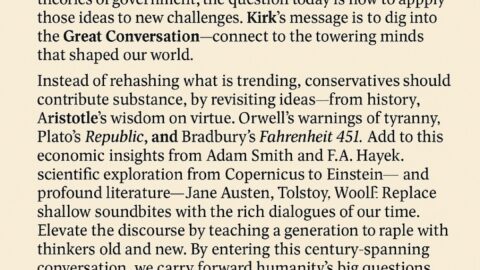Before diving into the mechanics of radicalization, it’s important to pause and acknowledge something deeper: how we read and process what we encounter. In times of loss and upheaval, our reading style often determines whether we gain wisdom—or simply react.
Mortimer Adler reminded us that not all reading is the same. There’s elementary reading, where we simply take in the words on the page. There’s inspectional reading, the quick skim to get the gist. Then there is analytical reading, where we slow down and study carefully. Finally, there is syntopical reading, the most demanding, where we compare multiple voices, perspectives, and sources to weave a fuller understanding.
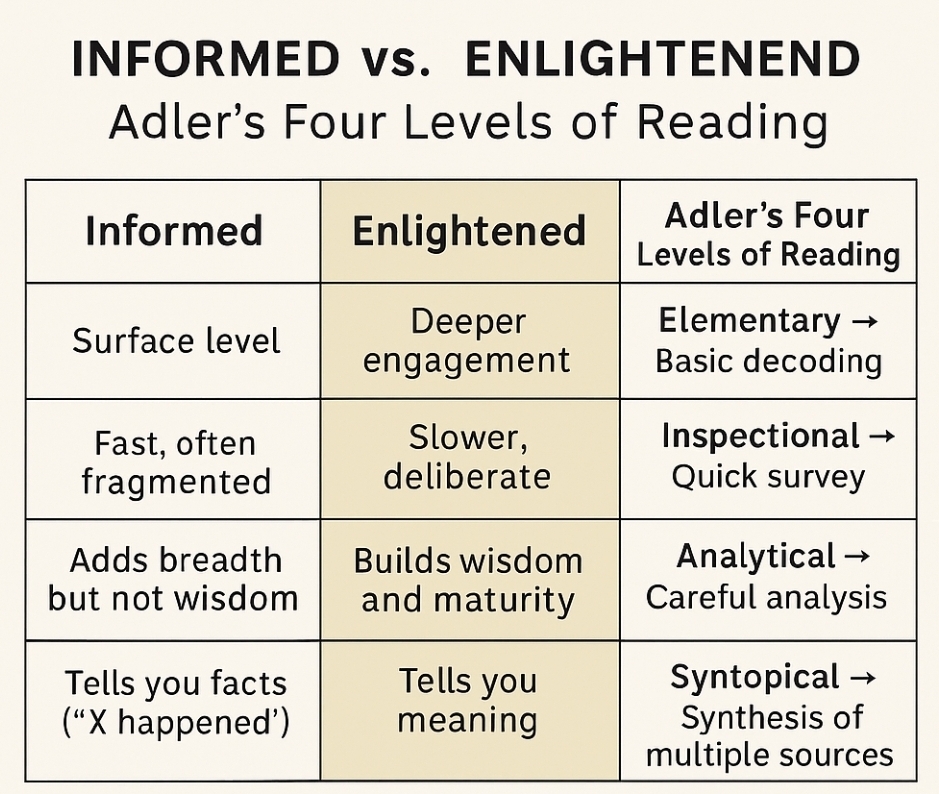
If we approach this subject only at the elementary or inspectional level, our grief and outrage may dominate our interpretation. We might dismiss the entire analysis because it collides with our emotions or challenges our assumptions. That’s cognitive dissonance—the natural resistance we feel when new insights press against our established beliefs. The temptation in those moments is to look away, to retreat into comfort, or to label the argument “too painful” or “too biased.” But to stop there is to miss the deeper lesson.
To honor Charlie Kirk, we must not throw this article—or the uncomfortable truths within it—aside. We need to challenge ourselves. That means moving past quick-take reading and leaning into Adler’s higher levels: analytical and syntopical. It means comparing perspectives, weighing risks, identifying nuances, and testing claims against history. It also means having the courage to read not only for information but for enlightenment.
And here is where emotional intelligence matters. I’ll be honest: I’m sad and angry over the loss of Charlie. That sadness is real, and so is the anger. But part of emotional intelligence is the discipline to feel without being ruled by those feelings. Like a water faucet, our emotions must flow so we can acknowledge them—but we must also know when to turn them down so that grief does not cloud our judgment.
Feeling first, analyzing second—that’s the discipline. We allow the sorrow, the outrage, the prayers to be felt fully, and then we pivot into careful reading: What is being said? Why is it framed this way? What larger forces are shaping the narrative? How do we avoid being swept into reaction ourselves? By practicing this pattern—emotion, then analysis—we keep our humanity without sacrificing our clarity.
This is the posture required as we step into the following sections: to feel deeply, but to read deeply as well. Only then can we see how grief, sacred language, and political urgency can inspire lawful mobilization—while also holding the potential to radicalize.
(using Trump’s “sleeping bear” metaphor as a blueprint)

1) The script in one paragraph
Radicalization rarely starts with “let’s get violent.” It begins with story: We are decent and moderate, they are unhinged and dangerous, and if they keep pushing, nature itself will unleash us. Trump’s recent riff—casting the Right as a “sleeping bear” and the Left as “cancer” that “keeps poking” until the bear “rips faces off”—isn’t just colorful language. At the elementary reading level, it’s a rallying insult that feels good to repeat. At the inspectional level, it’s a metaphor signaling “we’re restrained, they’re reckless.” But an analytical reading shows how this language creates a pipeline: grievance → moral permission → inevitability. And a syntopical reading compares it with past frames (post-9/11 “axis of evil,” COVID “unvaxxed as threat”), revealing how metaphors normalize escalation. Emotional intelligence means we can feel the sting and anger such language provokes, but—like turning down a faucet—discipline ourselves to step back and ask: Am I being drawn into inevitability logic? Or can I hold space for grief and frustration without granting them moral license to harden into violence?
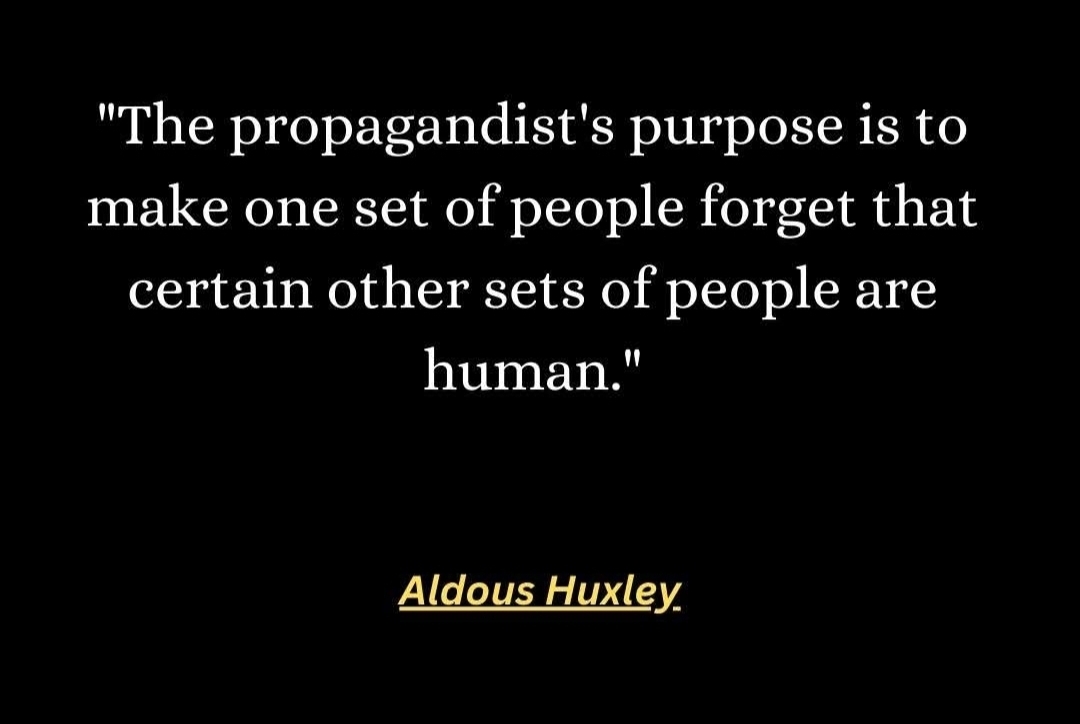
2) The pipeline: five psychological moves
Radicalization is rarely a leap. It unfolds like a slow-moving pipeline, with each step feeling reasonable in the moment. Here are five common moves—and how careful reading and emotional intelligence can help us see them before we’re carried downstream.
1. Grievance → “We’re the Victims”
- Elementary reading: The headline emotion—“They’re hurting us.” We feel it in our gut.
- Inspectional reading: We skim cause-and-effect: “They poke, we endure.”
- Analytical reading: We pause and ask: What are the actual harms? Are they exaggerated or generalized?
- Syntopical reading: We compare to other grievance narratives (post-9/11 “they hate us for our freedoms,” COVID “the unvaxxed are killing grandma”) and see the recurring pattern of victimhood weaponized.
- Emotional faucet: Feel the pain of loss, but turn it down before assuming all opponents are aggressors.
2. Permission → “We’re Allowed to Defend Ourselves”
- Elementary reading: The crowd cheers: “If they poke, we can strike.”
- Inspectional reading: It feels like common sense—nature itself defends.
- Analytical reading: We probe: Who decides when defense tips into offense? What laws and principles restrain us?
- Syntopical reading: Compare with doctrines like “preemptive war” or “stand your ground,” noticing how “defense” often becomes justification for aggression.
- Emotional faucet: Feel the instinct for self-preservation, then pause to ensure it isn’t morphing into moral license for escalation.
3. Inevitability → “Violence Will Happen Anyway”
- Elementary reading: The sleeping bear metaphor feels fated.
- Inspectional reading: We grasp the warning—“Keep pushing and the bear awakens.”
- Analytical reading: Ask: Is violence inevitable, or is inevitability being framed to excuse it?
- Syntopical reading: Compare to Cold War “mutually assured destruction” or the “clash of civilizations” frame. Each cast violence as destiny.
- Emotional faucet: Feel the fear such inevitability evokes, then cool it by remembering human agency: history is full of times when escalation was avoided.
4. Sanctification → “Our Cause is Holy”
- Elementary reading: Scripture and prayer anchor the moment in God.
- Inspectional reading: The symbols tell us: “This is sacred.”
- Analytical reading: We ask: Does sacralizing politics elevate us—or license hostility?
- Syntopical reading: Compare with crusades, manifest destiny, or even abolition movements—holy framing can fuel both justice and destruction.
- Emotional faucet: Feel the inspiration of faith, but temper it with humility and compassion, remembering Jesus’ command to love enemies.
5. Action → “Now It’s on Us”
- Elementary reading: The call to “get involved” feels like duty.
- Inspectional reading: We register the steps: canvass, write, run for office.
- Analytical reading: We ask: Are all suggested actions lawful, constructive, sustainable? Where are the boundaries?
- Syntopical reading: Compare with mobilizations after Pearl Harbor, the Civil Rights movement, or Occupy Wall Street. Energy can build renewal—or burnout and extremism.
- Emotional faucet: Feel the drive to act, then channel it deliberately toward civic, peaceful, and compassionate outlets.

3) A hypothetical case study (how one listener shifts)
To see the pipeline at work, imagine “David,” a 38-year-old listener who tunes in while driving home. He doesn’t arrive angry or radicalized. He arrives tired, frustrated with rising prices, and worried about his kids’ future. Step by step, we can trace how framing + emotion can shape his interpretation.
Elementary Reading: Surface Takeaway
David hears the “sleeping bear” metaphor. At the surface, it feels like entertainment—colorful trash talk, almost like sports banter. He chuckles, nods, and thinks: “Yeah, the Left sure is crazy.” His emotional faucet is wide open—he’s soaking in the feeling of being on the safe, sane side.
Inspectional Reading: The Quick Scan
As the program continues, David scans for the headline meaning: “We’re patient, but they’re poking us. If this keeps up, it’ll blow.” He doesn’t pause to weigh the claim; he just files it away as common sense. Emotionally, frustration has joined amusement, but the faucet hasn’t been touched.
Analytical Reading: Digging Deeper
Later that night, David replays the moment in his head. This time, he considers the logic: “If violence is framed as inevitable, what does that mean for me? For my neighbors?” He realizes the metaphor moves from grievance → permission → inevitability. His faucet check matters here: sadness about national division is real, but he consciously dials down anger so it doesn’t overwhelm the analysis.
Syntopical Reading: Contextual Comparison
Finally, David compares what he heard with other narratives: post-9/11 calls for war, COVID blame language, civil rights appeals. He sees the pattern—political rhetoric often casts the other side as the aggressor, making escalation feel righteous. By stepping into syntopical reading, David uses his faucet to move from raw emotion into perspective: anger is still felt, but he keeps it from driving conclusions.
Takeaway
Without deeper reading + emotional intelligence, David could have drifted from chuckling agreement (elementary) to simmering grievance (inspectional) to inevitability logic (analytical misread) that primes radicalization. With the full ladder of Adler’s reading and a working faucet on his emotions, he instead processes the rhetoric critically, honoring his feelings without being carried by them.
4) Why this works (the cognitive mechanics)
The “poking the bear” metaphor doesn’t radicalize instantly—it works because it taps deep psychological levers that feel obvious when skimmed, but reveal their danger only when read more deeply and managed with emotional intelligence.
Elementary Reading: The Hook
At the surface, listeners hear a vivid threat image—“the Left keeps poking, the bear will rip faces off.” The elementary reading is instinctual: laughter, nodding, or a quick jolt of anger. The faucet is wide open—emotions flood in unchecked.
Inspectional Reading: The Scan
On quick inspection, the metaphor frames responsibility: “We didn’t want violence, they caused it by poking.” The listener files away the moral shift without questioning it—responsibility has quietly moved from the Right’s actions to the Left’s provocations. Emotionally, this fuels righteous indignation: “We’re only reacting.”
Analytical Reading: The Logic
Looking carefully, we see the pipeline:
- Threat amplification: vivid enemy images heighten danger.
- Attribution shift: responsibility is reassigned.
- Norm setting: repetition of metaphors makes escalation feel “standard.”
- Moral licensing: restraint in the past is cashed in to justify harder steps.
Here, the faucet check is crucial: sadness or anger must be acknowledged but dialed down so analysis can expose the logic instead of being swept by it.
Syntopical Reading: The Comparison
When set alongside other historical scripts—post-9/11 “they forced us into war,” COVID “they endangered us”—we see a repeated formula: enemy provocation → inevitability of escalation. The deeper comparison shows the mechanism is not new, just newly dressed. With the faucet turned down, emotions don’t vanish, but they are contained so history and reason can widen perspective.
Takeaway
Without layered reading, the mechanics remain invisible. Most listeners stop at inspectional or emotional absorption. But practicing Adler’s deeper styles—analytical and syntopical—paired with emotional intelligence, keeps us from mistaking inevitability for truth. We can feel anger at the “poking,” yet still pause, analyze, and resist the drift into inevitability logic.
5) Early warning signs inside a movement
How can we recognize when mobilization risks sliding toward radicalization? It begins with language and habits—but how those cues are read makes the difference between awareness and drift.
Elementary Reading: The Words Themselves
At the surface, the shift is obvious: rhetoric sharpens from critique (“bad policy”) to contagion (“infestation,” “cancer”). Humor starts slipping toward violent scenarios. If we only stay at elementary reading, we chuckle or fume without noticing how much the baseline has shifted. The faucet is wide open—emotions respond, but no analysis tempers them.
Inspectional Reading: The Pattern
Quick scanning makes the phrases feel repetitive: “We had no choice,” “It’s inevitable,” “controlled opposition.” Inspectional reading lets these tropes file into memory as shorthand truths. Emotional intelligence here means asking: “Why am I nodding so quickly? Am I absorbing the frame or testing it?” The faucet needs a check—pause, dial down frustration, and notice the drift.
Analytical Reading: The Pipeline Behind the Words
Looking carefully, the moves become clear:
- Critique → contagion metaphors make opponents seem like disease.
- “No choice” language justifies escalation as inevitability.
- Jokes normalize what once was fringe.
- Peacemakers get rebranded as traitors.
- Preparation talk (“gear up,” “just in case”) grows outside real threat contexts.
Here, turning the faucet down is essential. Anger is natural, but if left running, it masks how words are shifting from persuasion toward escalation.
Syntopical Reading: Comparison to History
Placed beside other moments—1930s Europe, post-9/11 escalation, early stages of sectarian conflict—the pattern is recognizable. The same drift in language, humor, and preparation precedes shifts from lawful activism to fringe violence. Syntopical reading lets us feel the sadness of recognition while keeping emotions contained enough to see: this has happened before, and it can be prevented again.
Takeaway
Early warning signs are not fate; they are signals. If a movement practices only elementary and inspectional reading, those signals fade into background noise. But with analytical and syntopical reading—and with emotional faucets managed—the community can catch drift before it becomes destiny.
6) Guardrails that don’t neuter conviction
Conviction is essential; without it, movements dissolve into apathy. But conviction without guardrails can slide into absolutism. The key is to build boundaries that preserve strength while preventing drift into destructive channels. Adler’s reading ladder and the faucet metaphor help us here: read deeply enough to see patterns, and feel emotions fully but then regulate them.
A. Define Red-Line Principles, Not Just Enemies
Rule: “No doxxing, no political violence, no cheering it on—ever.”
- Elementary reading: A simple slogan.
- Inspectional: It’s repeated often, so it sticks.
- Analytical: We see why naming “no-go” behaviors matters as much as naming enemies.
- Syntopical: Compare with other moments in history when red-lines weren’t clear—movements drifted into extremism.
Faucet check: Anger may tempt us to excuse “small” breaches. Regulation means holding the line even when furious.
B. Separate Strength from Spectacle
Channel energy into lawful pressure: policy drafting, local institutions, primaries, courts, and parallel culture-building.
- Elementary: “Get involved.”
- Inspectional: It looks like civic duty.
- Analytical: True strength is measured in outcomes, not viral clips.
- Syntopical: Past revolutions show: spectacle burns bright but dies quickly; institutions endure.
Faucet check: Emotions want fireworks. Wisdom pours them instead into lasting construction.
C. Watch the Metaphors
Replace disease/animal metaphors with constitutional and ethical frames: neighbors, citizens, constraints, due process.
- Elementary: Language shift feels minor.
- Inspectional: It softens tone.
- Analytical: Metaphors shape moral imagination—disease invites eradication, citizen invites cooperation.
- Syntopical: History warns us: dehumanizing metaphors precede persecution.
Faucet check: Emotion clings to powerful images. Regulation means choosing language that channels courage without dehumanization.
D. Reward Bridge-Talk
Publicly praise those who debate opponents in good faith. Make restraint a badge of honor, not a slur.
- Elementary: “Be nice.”
- Inspectional: It looks like weakness.
- Analytical: It’s actually strategic—bridge-builders keep coalitions resilient.
- Syntopical: Every durable republics has depended on bridge-talkers to keep civil society intact.
Faucet check: Emotion may sneer at restraint. Regulation helps us see it as courage under pressure.
E. Reality-Check Loops
Before sharing incendiary clips: What’s the full context? Who benefits from me amplifying this? Keep a “loyal opposition” friend who can push back without being excommunicated.
- Elementary: “Think before sharing.”
- Inspectional: It feels like slowing momentum.
- Analytical: Context changes meaning; amplification without context can serve your opponent.
- Syntopical: Movements that policed their own information spread lasted longer and kept credibility.
Faucet check: Emotions crave instant sharing. Regulation means pausing to cool down, analyze, and then decide.
7) A closing thought
You can hold strong—even fiery—convictions without adopting narratives that make violence feel like destiny. The “sleeping bear” metaphor is powerful because it shifts perception before it shifts behavior; it moves the lines in the mind long before anything happens in the street. The safeguard is to read such rhetoric at every level and regulate our emotions like a faucet: let them flow, then deliberately turn them off for analysis.
- Elementary reading: Hear the metaphor and recognize the surface meaning—anger framed as natural inevitability.
- Inspectional reading: Notice how quickly it escalates the story arc: poke, poke, then violent release.
- Analytical reading: Ask why the metaphor works—how it bypasses policy debate and channels frustration into primal imagery.
- Syntopical reading: Compare with historical examples (9/11 framing, COVID fear narratives, even older propaganda) to see how emotion + inevitability talk prepared the ground for overreach.
Faucet check: Grief, fear, or anger will surge when hearing these stories—and that’s human. But discipline means not letting the faucet run endlessly. We feel, then we pause, then we analyze with depth and perspective.
The future of a principled movement depends on this maturity. Spot the moves, refuse the bait, and build the kind of disciplined, principled coalition that wins without becoming what it hates.

